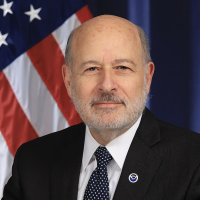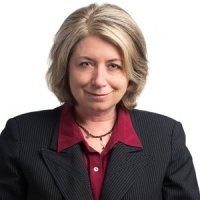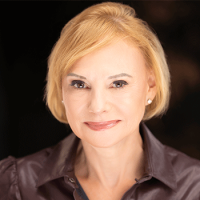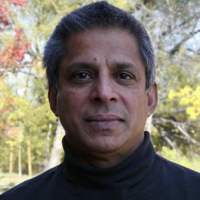Water @ Wilson Series Launch | Water, Peace, & Security: New Tools for a New Climate
Submit a question
Water sustains life on our planet. And access to clean and safe water is foundational to society. So why has it only been in recent years that water has risen to the top of discussions of climate and security? Richard W. Spinrad, the Under Secretary of Commerce for Oceans and Atmosphere and NOAA Administrator, says that one of the biggest reasons is the major impact that climate-related changes in precipitation like droughts and extreme rainfall are having across the globe: “We’re starting to see things like we’ve never seen before. The nature of storms is changing: We saw five feet of rain fall in Hurricane Harvey. Five feet.”
Spinrad’s opening remarks at the launch of the Wilson Center’s latest Water@Wilson series—“Water, Peace, & Security: New Tools for a New Climate”—helped the audience identify both the immense stakes of the challenges surrounding water, as well as new tools available to navigate the growing crisis around this essential resource.
One of these new instruments is a Global Early Warning Tool developed by the Water, Peace and Security (WPS) partnership, which made its debut at the event. The data compiled and presented visually by this initiative gives decisionmakers essential information about conflict risks related to water, food, and energy that will enable preventive action. Kitty van der Heijden, Director General for International Cooperation at the Ministry of Foreign Affairs, Netherlands, observed that the project (a decade in the making) will shed significant new light on the “complex interrelationships” that drive water-related crises. “We need to use [the Global Early Warning Tool] to make sure that we bring the perspective of a life and dignity to poor people who can’t defend themselves,” she said.
Better tools and partnerships are only part of the solution, however. Addressing the crisis at hand also will require new frameworks—including one to better predict climate security risks developed by the Wilson Center in partnership with NOAA and the University Corporation for Atmospheric Research. Spinrad observed that keeping a global view of the challenges surrounding water is essential: “You cannot just treat the issues [as] inherent to any particular domestic partner. It was Isaac Asimov who said, ‘Saying that the Japanese have a pollution problem is like saying there’s a leak in your end of the boat.’ This is a problem we’re all having to face.”
Water and Conflict in Pakistan: Climate, Geopolitics, and Livelihood
At the center of the event was a roundtable discussion that examined the importance of extending better predictive capacity on water crises to all corners of the globe—especially in nations that bear the brunt of climate impacts.
For instance, Pakistan’s contributions to global emissions are negligible. Yet it is a country where climate change is intersecting with a host of other factors to create conditions for livelihood loss and unrest. Sarah Hayat, a climate change law and policy expert who has advised Pakistan’s government, noted that “Pakistan is a water scarce nation. On the supply side, [there is] inequitable distribution of water. And then, of course, climate change is making all of it much worse for us.”
The fraught Indus Water Treaty is only the most prominent flash point in a simmering regional tit-for-tat conflict between Pakistan and India that has led to persistent hostility on both sides. Hayat acknowledged that Pakistan has at times unjustly blamed India for its own troubles—the country has struggled with water mismanagement—but she also observed that access to water should not be an “either-or” scenario. “Each country and its citizens need water, and each country and its citizens should have the security associated with water,” said Hayat. “Water should never be political; it should just be a basic human right.”
Water scarcity in Pakistan also creates internal unrest and instability, especially in terms of food security and livelihoods. “Pakistan is primarily an agrarian economy,” Hayat pointed out, “providing 9.2 percent of our GDP and providing employment to 39 percent of the country.” Yet the vast majority of food produced in Pakistan—roughly 90 percent—depends on irrigated water. “Without water in our canals, without water in our rivers, we are relying on groundwater and groundwater sources are being depleted,” she explained. This water scarcity also drives migration from rural to urban areas in Pakistan, with all the societal and economic stressors that accompany it—including rising prices for food and commodities and added pressure on limited water and sanitary facilities.
Pakistan is one of the top ten most vulnerable countries to climate change, and an increased number of extreme events precipitated by climate change only add to its hardship and conflict risk. Pakistan’s climate risk also makes the country’s present lack of any early warning systems all the more problematic. For instance, Hayat explained that Pakistan’s roughly 8,000 glaciers are a key part of its vulnerability, since glacial melt can be devastating when it leads to outburst floods in glacial lakes. The nation’s lack of early warning systems—like a loud siren—to alert people of such floods has repercussions for populations past the immediate catastrophe. “In the wake of floods, you have the lack of clean drinking water, which causes water-borne diseases,” said Hayat. Floods can also trigger conflict over food and water among those affected by the flood and can lead to even greater migration.
Virtuous Cycles and Holistic Approaches
The Global Early Warning Tool should help leaders, policymakers and researchers in Pakistan and elsewhere grapple with these challenges.
Charles Iceland, the Acting Global Director for Water at the World Resources Institute, offered a deeper dive into the work of the Water, Peace, and Security Partnership and its new instrument. He said that the partnership addresses the water-insecurity nexus through a variety of activities that include developing the data and visualizations at the heart of the new tool. Raising awareness at the global, national, and local levels is one way that the partnership attempts “to build the capacity of stakeholders to better manage their water resources,” with the ultimate goal of turning “vicious cycles for border insecurity into virtuous cycles of water-based peace and cooperation.”
The data offered by the new instrument will help bring stakeholders together to have “conversations about how they’re going to govern their water resources,” said Iceland. The Global Early Warning Tool “has over 80 contextual datasets, grouped under various topics: migration, water, infrastructure, energy, demographics, economics, food governance and conflict.” Yet while this work entails looking at the direct and indirect impact of extreme temperatures on people and nature, or on how weather extremes are linked to devastating pest infestation, the initiative also considers the underlying conditions in which extreme events occur. Citing the heavy water consumption associated with irrigation in Northern India, Iceland noted that “we are cognizant that chronic stressors contribute to negative outcomes.”
Roger Pulwarty, Senior Scientist at the National Oceanic Atmospheric Administration, painted a broader picture of the interplay between risk and early warning systems. In a context of local imbalances and regional and global network disruptions, traditional approaches to risk management are being overwhelmed. “We’re in a stage of complex compounding and cascading risk,” Pulwarty observed, adding that “the old style of taking event by event isn’t working.”
The Improving Predictive Capabilities for Climate Security Risks project launched by the Wilson Center and NOAA aims to build an evidence-based framework to address weather, climate, and water stressors in tandem. It already has featured a baseline assessment of several hotspots, including the Horn of Africa, the Caribbean, and most recently, Central America. Drawing from the project’s insights, Pulwarty emphasized that disasters aren’t an inevitable outcome of extreme events, but happen when a community’s capacity to respond has been overwhelmed. Yet with the right prevention, resilience is possible. Ethiopia experienced a major drought in 2016, for instance, but unlike a drought that had caused hundreds of thousands of deaths a few decades earlier, the country did not collapse that year.
Pulwarty said that on-the-ground partnerships, robust early warning and decision support services, and the existence of social safety nets helped realize this outcome in Ethiopia. Yet the new tools on water crises also offer fresh insights into the complex relationship between inequity and global systems that extract resources from populations and limit their access to vital water or land conversion for agriculture. The impacts often undermine a country or region’s capacity to respond to climate change. Pulwarty added that the growing effort to connect biodiversity efforts with climate resilience and development to prevent to depletion of “ecosystems that support people’s ability to respond in the long term” holds promise. “Local is not enough,” he said. “Disruptions in food security and water security have a global network to them.”
From Research to Governance
The Water@Wilson event ended with a “Fireside Chat” on U.S. Water Policy between Stephanie Epner, Special Advisor and Acting Senior Director for Climate and Energy at the National Security Council and Wilson Center Senior Fellow Sherri Goodman. As the Biden Administration has sought to “change the narrative” on climate, Goodman observed, Epner has been “part of making climate change and water and security issues…top tier since day one.”
One key White House initiative to advance U.S. government policy on climate change is the President’s Emergency Plan for Adaptation and Resilience (PREPARE), and Epner emphasized the centrality of interagency cooperation, community-driven decisions, and equity in these efforts. PREPARE is about “looking at the full interagency,” she continued, “and figuring out how we [can] be bringing the strengths of every different department and agency to bear. And doing so in a way that [takes] into consideration equity and participation and local engagement.”
The new tools discussed at the event—and the vast network of research that helped create them—were essential to creating PREPARE and other White House climate initiatives. “This is building on the work of research institutions, universities, civil society, activists,” Epner observed. “People who have been working on these issues for a very long time.”
Shaping policy on water, climate and security involves allowing the “wealth of expertise” on climate to “refine our thinking,” Epner concluded. “The execution of all of these strategies is really trying to use every tool at our disposal…Because we know we need it.”
Agenda
WELCOME
Lauren Herzer Risi, Program Director, Environmental Change & Security Program, Wilson Center
- Lauren Herzer Risi works with policymakers, practitioners, donors, and researchers to generate innovative, transdisciplinary solutions to development and security challenges related to environmental change and natural resource management. She has authored and edited a number of reports on environmental security and is the managing editor of New Security Beat; co-producer of a series of podcasts exploring the unintended consequences of responses to climate change; and co-producer of a series on water, conflict, and peacebuilding. She served as a Crisis Corps volunteer with the Peace Corps and FEMA in New Orleans following Hurricane Katrina. Risi holds a master’s degree in environmental security and peace from the UN-mandated University for Peace in Costa Rica.
OPENING REMARKS
Hon. Richard W. Spinrad, PhD., Under Secretary of Commerce for Oceans and Atmosphere and NOAA Administrator
- Honorable Dr. Richard Spinrad serves as the Under Secretary of Commerce for Oceans and Atmosphere and the 11th NOAA Administrator. Dr. Spinrad is responsible for the strategic direction and oversight of the agency and its over 12,000 employees, including developing NOAA’s portfolio of products and services to address the climate crisis, enhancing environmental sustainability and fostering economic development, and creating a more just, equitable, diverse, and inclusive NOAA workforce. Most recently, Dr. Spinrad served as a Professor of Oceanography and Senior Adviser to the Vice President of Research at Oregon State University (OSU). He was also Vice President for Research at OSU from 2010-2014.
WPS TOOL LAUNCH
Kitty van der Heijden, Director-General International Cooperation, Ministry of Foreign Affairs, Netherlands
- Kitty van der Heijden is Director General for International Cooperation at the Ministry of Foreign Affairs, Netherlands. Her responsibilities include development cooperation policy, implementation and funding. Central themes are gender, sustainable economic development, and climate policies.
Alyssa Offutt, WPS Global Capacity Development Lead and Doctoral Candidate, IHE Delft Institute for Water Education
- Alyssa Offutt is the Global Capacity Development Lead of the Water, Peace, and Security Partnership and a Doctoral Candidate at the IHE Delft Institute of Water Education. She has been supporting the partnership since 2020 on its engagements in Iraq, Mali, Kenya, global trainings, and as part of the management team. Alyssa is a Professional Engineer and specializes in water quality diplomacy, contaminant fate and transport, and the multi-scalar relationships of water, conflict, and cooperation.
WPS TOOL DEMONSTRATION
Samantha Kuzma, Acting Aqueduct Director, World Resources Institute
- Samantha Kuzma researches, develops, and applies water-related data for a diverse set of projects. She is part of the Water, Peace, and Security (WPS) project, which aims to enable timely and effective responses to water-related challenges in hopes of mitigating conflict. Her work on this project includes building a machine learning model to forecast violent conflict around the world. Besides WPS, Sam also works on the Aqueduct Project. Her primary responsibility is to manage the update of Aqueduct Floods, a tool designed to identify coastal and riverine flood risks and analyze the costs and benefits of investing in flood protection. She also performs water risk assessments for corporate clients. Her ongoing research includes exploring the connection between water and conflict, promoting adaptation measures to combat future flood risk, and helping partners prioritize investments in watershed stewardship.
"EARLY WARNING SYSTEMS FOR ALL"
Eng. Hatem Hammed, Director General of the National Center for Water Resources Management, Republic of Iraq Ministry of Water Resources
- Hatem Hammed Hussein serves as the Director General of Iraq’s National Center for Water Resources Management, a formation of the Ministry of Water Resources.
Sara Hayat, Lawyer/Climate Change Specialist, Climate Change, Sustainability & Resilience Consultants
- Sara Hayat specializes in climate change law and policy and has worked on multiple nuances of climate change in Pakistan, including advising the Government on preparing Pakistan's updated Nationally Determined Contributions (NDC's), 2021. She's an internationally renowned climate advocate and brings Pakistan's climate plight to the forefront.
Charles Iceland, Global Director, Water (Acting), World Resources Institute
- Charles Iceland is Global Director, Water (Interim) with WRI’s Food, Forests, Water, and the Ocean Program. In addition to overseeing the Global Water Team, Charles is implementing the Water, Peace, and Security Partnership with several European and American partner organizations. He previously directed the Aqueduct project at WRI, which developed the concept for the Aqueduct Water Risk Atlas, which maps a variety of global water risks and has become the premier online tool for global water risk assessment and prioritization.
Roger Pulwarty, Senior Scientist, National Oceanic and Atmospheric Administration
- Roger Pulwarty is the Senior Scientist in the National Oceanic and Atmospheric Administration Physical Sciences Division in Boulder, Colorado. He has served as lead author on the IPCC, UNDRR, UNCCD, and the U.S. National Climate Assessments. He is an advisor on early warning and adaptation to national and international agencies, including the UN, the Organization of American States, and the Inter-American Development Bank. Roger has been a long-time leader in institutionalizing interdisciplinary approaches to program design and has helped design and lead widely-recognized programs including the U.S. National Integrated Drought Information System (NIDIS), the Regional Integrated Sciences and Assessments Program, and the GEF Mainstreaming Adaptation to Climate in the Caribbean program. His research and publications focus on weather, water and climate extremes, adaptation, and information services in the U.S., Latin America and the Caribbean.
Moderator: Hon. Sharon Burke, President, Ecospherics; Global Fellow, Wilson Center
- Sharon Burke is the President of Ecospherics, a new research and advisory organization, and a Global Fellow with ECSP. Previously, she was the Director of Resource Security at the civic organization, New America. She has also served in senior U.S. government positions in the State Department and Pentagon, most recently as the Assistant Secretary of Defense for Operational Energy and an advisor to the Biden-Harris Transition Team.
FIRESIDE CHAT ON US WATER POLICY
Stephanie Epner, Special Advisor and Acting Senior Director for Climate and Energy, National Security Council, The White House
- Stephanie Epner serves as a Special Advisor and Acting Sr. Director for Climate and Energy at the White House National Security Council. Previously, she was Senior Advisor to the Special Presidential Envoy for Climate Change at the U.S. Department of State, as well as the climate lead on the Secretary of State’s Policy Planning Staff. Stephanie was co-lead for international climate policy on the Biden-Harris transition team. Before returning to government, she was the director and founder of the Climate in Foreign Policy Project at the United Nations Foundation and a fellow at the Carnegie Endowment for International Peace. She also served in the Obama Administration at both the State Department and the U.S. Environmental Protection Agency.
In conversation with Sherri Goodman, Senior Fellow, Wilson Center
- Sherri Goodman is a Senior Fellow at the Wilson Center’s Environmental Change and Security Program and Polar Institute. She is credited with educating a generation of U.S. military and government officials about the nexus between climate change and national security, using her famous coinage, “threat multiplier,” to fundamentally reshape the national discourse on the topic. Sherri serves as Vice Chair of the Secretary of State's International Security Advisory Board and on the EXIM Bank's Council on Climate. A former first Deputy Undersecretary of Defense (Environmental Security) and staff member on the Senate Armed Services Committee, Goodman has founded, led, or advised nearly a dozen research organizations on environmental and energy matters, national security, and public policy.
EVENT CONCLUDES
Speakers




Introductions


Moderators

Founder and President, Ecospherics

Author, Threat Multiplier: Climate, Military Leadership & the Fight for Global Security.
Panelists



Hosted By

Environmental Change and Security Program
The Environmental Change and Security Program (ECSP) explores the connections between environmental change, health, and population dynamics and their links to conflict, human insecurity, and foreign policy. Read more


Indo-Pacific Program
The Indo-Pacific Program promotes policy debate and intellectual discussions on US interests in the Asia-Pacific as well as political, economic, security, and social issues relating to the world’s most populous and economically dynamic region. Read more


Canada Institute
The mission of the Wilson Center's Canada Institute is to raise the level of knowledge of Canada in the United States, particularly within the Washington, DC policy community. Research projects, initiatives, podcasts, and publications cover contemporary Canada, US-Canadian relations, North American political economy, and Canada's global role as it intersects with US national interests. Read more


China Environment Forum
China’s global footprint isn’t just an economic one, it’s an environmental one. From BRI investments in Africa and Asia to its growing presence in Latin America, understanding China’s motivations, who stands to gain - and who stands to lose - is critical to informing smart US foreign policy. Read more


Global Europe Program
The Global Europe Program is focused on Europe’s capabilities, and how it engages on critical global issues. We investigate European approaches to critical global issues. We examine Europe’s relations with Russia and Eurasia, China and the Indo-Pacific, the Middle East and Africa. Our initiatives include “Ukraine in Europe”—an examination of what it will take to make Ukraine’s European future a reality. But we also examine the role of NATO, the European Union and the OSCE, Europe’s energy security, transatlantic trade disputes, and challenges to democracy. The Global Europe Program’s staff, scholars-in-residence, and Global Fellows participate in seminars, policy study groups, and international conferences to provide analytical recommendations to policy makers and the media. Read more


Kennan Institute
The Kennan Institute is the premier US center for advanced research on Eurasia and the oldest and largest regional program at the Woodrow Wilson International Center for Scholars. The Kennan Institute is committed to improving American understanding of Russia, Ukraine, Central Asia, the South Caucasus, and the surrounding region through research and exchange. Read more


Latin America Program
The Wilson Center’s prestigious Latin America Program provides non-partisan expertise to a broad community of decision makers in the United States and Latin America on critical policy issues facing the Hemisphere. The Program provides insightful and actionable research for policymakers, private sector leaders, journalists, and public intellectuals in the United States and Latin America. To bridge the gap between scholarship and policy action, it fosters new inquiry, sponsors high-level public and private meetings among multiple stakeholders, and explores policy options to improve outcomes for citizens throughout the Americas. Drawing on the Wilson Center’s strength as the nation’s key non-partisan policy forum, the Program serves as a trusted source of analysis and a vital point of contact between the worlds of scholarship and action. Read more


Mexico Institute
The Mexico Institute seeks to improve understanding, communication, and cooperation between Mexico and the United States by promoting original research, encouraging public discussion, and proposing policy options for enhancing the bilateral relationship. A binational Advisory Board, chaired by Luis Téllez and Earl Anthony Wayne, oversees the work of the Mexico Institute. Read more


Middle East Program
The Wilson Center’s Middle East Program serves as a crucial resource for the policymaking community and beyond, providing analyses and research that helps inform US foreign policymaking, stimulates public debate, and expands knowledge about issues in the wider Middle East and North Africa (MENA) region. Read more



